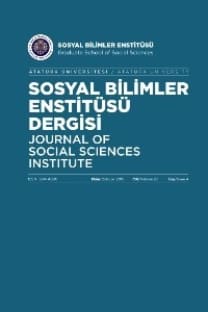İngilizce öğretmenliği bölümündeki pedagojik derslerin programları: Bir son değerlendirme
İngilizcenin öğretimi temel eğitim alanlarından biri olduğundan beri, ingiliz dili eğitimi programları daha da artarak önem kazanmıştır. Bu yüzden, bu çalışmada İngilizce öğretmenliği bölümündeki pedagojik derslerin hedeflenen amaca ulaşıp ulaşmadığının belirlenmesi amacıyla bir son değerlendirme gerçekleştirilmiştir. Çalışmada farklı kaynaklardan faydalanmak amacıyla döküman analizi, anket ve görüşme bulguları içiçe geçirilerek değerlendirilmiştir. Ana çalışmada, önce pilot uygulama, anketin güvenilirlik çalışması, görüşmelerin iç geçerlilik oranı ve hedeflenen ders amaçları belirlenmiştir. Elde edilen verilerin ışığı altında, pedagojik ders içeriklerinin zayıf ve güçlü yönleri belirlenerek etkili ve kaliteli ders içeriklerinin geliştirilmesi hedeflenmiştir.
The program of pedagogical courses at an english language teaching department: A summative evaluation
As teaching English has been a major educational field, evaluating English language teachers education programs are steadily getting more and more important. In this study, therefore, the program of the pedagogical courses in ELT departments is evaluated to find out whether they achieve the intended outcomes or not. To triangulate the study a document analysis, a questionnaire and the interview findings are combined to provide valid and reliable results. The piloting and the face validity of the questionnaire, the inter-rater reliability of the interview and the defined objectives of the pedagogical courses are determined before the main study. In the light of the data collected, the weak and the strong sides of the program are defined to improve the efficiency and the quality of the contents of the pedagogical courses.
___
- Bhola, H. S. (1990). Evaluating Literacy Development Projects, Programs And Campaigns: Evaluation Planning, Design and Implementation and Utilization of Evaluation Results. Hamburg, Germany: UNESCO Institute for Education.
- Brown, J. D. (1995). The Elements of Language Curriculum. Boston: Heinle &Heinle Publishers.
- Coşkun, A.& Daloğlu, A. (2010). Evaluating an English language teacher education program through peacocks model. Australian Journal of Teacher Education, 35 (6), 24- 42.
- Firth, A. (1996). The Discursive Accomplishment of Normality on Lingua Franca English and Conversation Analysis. Journal of Pragmatics, 26, 237-59.
- Grossman, G. M., Onkol, P.E. and Sands, M. (2007). Curriculum Reform in Turkish Teacher Education: Attitudes of Teacher Educators Towards Change in an EU Candidate nation. International Journal of Educational Development, 27, 139-50.
- Leininger, M. M. (1985). Ethnography and Ethnonursing: Models and Modes of Qualitative Data Analysis. In M.M. Leininger (Ed.). Qualitative Research Methods in Nursing. (pp.33-72). Orlando,FL: Grune & Stratton.
- McMillan, James H. & Schumacher, Sally (1997). Research in Education. Longman Press.
- Peacock, M. (2009). The Evaluation of Foreign-Language-Teacher Education Programmes. Language Teaching Research, 13(3), 259-78.
- Richards, J.C. (2001). Curriculum Development in Language Teaching. Cambridge University Press.
- Scriven, M. (1991). Evaluation Thesaurus. 4th ed. Newbury Park, CA.
- Skilbeck M. & Reynolds, John B. (2002). Curriculum Planning; Culture. London: Open Books Publishing Ltd. Ur, P. (1992). Teacher learning. ELT Journal, 46, 56-61.
- Weston, C., McAlpine, L., & Bordonaro, T. (1995). A model for understanding formative evaluation in instructional design. Educational Technology Research and Development, 43(3), 29-46.
- Widdowson, H.G. (1983). Learning Purpose and Language Use. Oxford: Oxford University Press.
- YOK (Yüksek Öğretim Kurulu), Eğitim-Öğretim, Öğretmen Yetiştirme. Higher Education Council (Report on Regulation of Faculties of Education) Retrieved March 17, 2008 from http://www.yok.gov.tr/egitim/ogretmen/yeni_programlar_ ve_icerik.htm
- ISSN: 1304-4990
- Yayın Aralığı: Yılda 4 Sayı
- Yayıncı: Atatürk Üniversitesi Sosyal Bilimler Enstitüsü Müdürlüğü
Sayıdaki Diğer Makaleler
Sırça Fanus'ta Esther'in İntiharının anne rahmine geri dönme çabası bağlamında incelenmesi
Havza planlamalarında coğrafyanın rolü ve Türkiye'de havza planlamacılığı
Türkiye'de bazı yatırım fonlarının performans değerlemesi
O Berna İPEKTEN, Nouhali MARDOMKHAH
Postmodern landscape: Postmodernist discourse in Mark Ravenhill's Shopping and Fucking
Aile İçi Şiddet: Bir Kamu Politikası Analizi
Havza Planlamalarında Coğrafyanın Rolü ve Türkiye’de Havza Planlamacılığı
